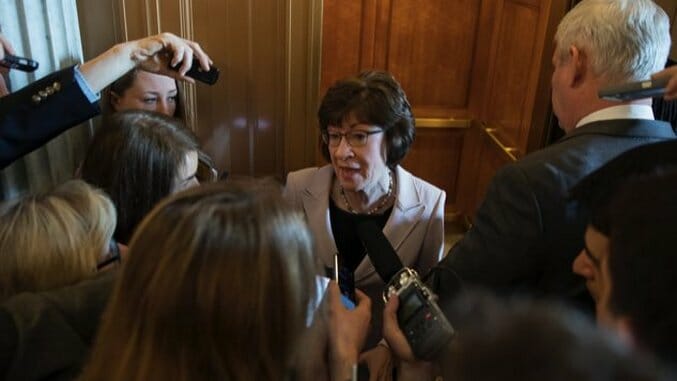Susan Collins, A Uniquely Bad Senator, Turns to the Dark Money
Photo courtesy of Getty
There are undoubtedly perks associated with growing up in Maine, but one of the sad truths is that at age 13, I was forced—along with the rest of my high school—to listen to Susan Collins.
It was fall 2006, and Senator Collins spoke in our high school’s auditorium, which I note—to provide a sense of scale—doubled as our cafeteria. Collins has never been an engaging speaker, and this day was no exception; a Daily Kos post from around then suggests she discussed “ethics in public office.” I wonder whether she believed this would genuinely engage a crowd of sleep-deprived teenagers on a Tuesday morning; I doubt she cared. For Collins, bland has always played fine. Two years after that speech, she’d earn a third Senate term with more than sixty-one percent of the vote—in a state that was simultaneously lumbering to the polls for Barack Obama—and in 2014, she cruised to a fourth term with a whopping sixty-eight percent.
During her twenty-plus years in the Senate, Collins has built a career and a constituency solely through dogged tepidness, by painstakingly considering cocking an eyebrow at all the proper moments. Benefitting from favorable comparisons back home—most notably to Paul LePage, who from 2010 until 2018 had been uncorking both racist dogwhistles and diatribes from within the governor’s mansion—and in Washington, where Mitch McConnell’s obstructionism had cemented itself, for a while Collins seemed different. Moderate, even competent. A veritable Aisle-Crosser. And as many sad liberals hoped in vain as the 45th president took over, a staunch member of the #resistance.
She wasn’t. Collins’ approval numbers faded throughout 2017, as she proved to only really break with the president and her party when she knew Republicans would still get what they want (as her flip-flop on Betsy DeVos’ confirmation made clear). The major blow to her perception came the following fall, as names like Tobin and Squee rose to unprecedented notoriety. Once it became clear that Republicans actually needed her to confirm Brett Kavanaugh on the Supreme Court, she—after a forty-three-minute speech detailing her hesitations—fell in line. Mainstream Democratic supporters, finally realizing their clothed-sheep friend had long been a wolf, began organizing fundraisers to run her out of Washington in 2020, and Collins’ disapproval ranking ballooned to the second-highest in the Senate, just behind McConnell’s.
Now, thirteen months from election day, a few questions arise: Will Collins run in 2020? And who wants her to?
The native of Caribou—a scant twenty minutes from the Canadian border—has officially stated no plans of running. Yet the Collins tea leaves are never too difficult to read. After the Supreme Court vote, Collins has shamelessly tried to reinstate her “have-you-no-shame-sir” bonafides to appeal to Maine’s moderate (and fairly-purple) electorate, only voting with Trump one-third of the time in the new Congressional session.
More crucially, she’s getting that green. On July 8, she designated “Collins For Senator” as her principal campaign committee for the 2020 election, and the dark money has begun to roll in: In August, the Kennebec Journal and Morning Sentinel uncovered that Leonard Leo, the Federalist Society executive vice president who’s known as Trump’s “judge whisperer,” had bought a mansion on Mount Desert Island, where he hosted a fundraiser for Collins. (Leo himself donated the personal maximum for the primary—$2,800—to the Collins For Senator fund in June.)
While the official declaration of her candidacy is yet to come, the funding scene suggests that Collins is gearing up for a fight. During her last reelection campaign, her campaign committee raised just under $5.3 million from January 2013 to December 2014; from Jan. 1, 2013, through June 30 of that year, it had raised just under $720,000. During the same timeframe in 2019, though, it tallied more than $3.5 million.
What’s most interesting, though, are the people donating to Collins who really haven’t before. Leo’s donation in this past cycle was his first ever to the Maine Senator, and a number of other conservative bigwigs are making it clear that she now has their backing, including:
—Sheldon Adelson, CEO of Las Vegas Sands; donated the maximum of $5,600* (as did his wife, Miriam)
—Jimmy Haslam, owner of the Cleveland Browns; $5,600
—Jerry Reinsdorf, owner and chairman of the Chicago Bulls; $5,600 (as did his wife, Martyl; son Michael also donated $5,000)
—Charles R. Schwab, CEO of Charles Schwab; $5,600
—Bud Selig, former commissioner of Major League Baseball; $5,600
—And finally, this doesn’t really matter but I found it interesting: Jeff Bezos’ parents, Miguel and Jacklyn, who each donated $5,600
*$5,600 is the maximum donation, as an individual can donate $2,800 to the primary campaign and $2,800 to the general campaign.
-

-

-

-

-

-

-

-

-

-

-

-

-

-

-

-

-

-

-

-

-

-

-

-

-

-

-

-

-

-

-

-

-

-

-

-

-

-

-

-









































